现在完成时
时态详解:现在完成时

时态详解:现在完成时一、如何理解现在完成时现在完成时是英语中一个很重要的时态,也是很容易弄错的一个时态。
首先,我们来看看“现在完成时”该如何理解。
你可能会根据字面意思将其理解为:现在完成时就是表示现在已经完成的动作。
但是,这样的理解是很不全面的理解,甚至是很危险的!因为这样的理解将来误导你混淆现在完成时与一般过去的区别。
现在完成时有两个主要用法:一是已完成用法,也叫影响性用法。
该用法的现在完成时表示一个过去发生的动作在过去已经完成,并且这个过去发生并完成的动作对现在有影响或结果,同时说话强调的或感兴趣的就是这个影响或结果,如汉语说“他已离开这个城市了”,其中的“离开”肯定发生了,它对现在的影响或结果就是“他现在已不在这个城市了”;又如汉语说“有人把窗户打破了”,显然“打破窗户”这一动作发生在过去,并且在过去已经完成了,但说话人强调的重点是打破窗户对现在的影响——窗户现在仍是破的。
现在完成时的另一个用法叫未完成用法,也叫持续性用法。
该用法的现在完成时表示一个过去发生的动作或开始的状语在过去并未完成或结束,而是一直持续到现在,并且有可能继续下去(也可能到此结束),如汉语说“他在我们教书已有30年了”,显然“他在我们学校教书”是从30年前开始,并且一直教到现在,已经持续了30年;又如汉语说“自上个星期以来他一直很忙”,显然“忙”是从上个星期开始的,并且这一“忙”就一直忙到现在。
二、现在完成时构成与用法现在完成时由“have / has +过去分词”构成。
如:He has seen the film several times. 这部电影他已看了好几次。
I have known her for a long time. 我认识她很长时间了。
句中的has seen 和have known 均为现在完成时,第一句属影响性用法,其影响是“他对电影内容非常熟悉了”;第二句属持续性用法,指“认识她”已持续了很长一段时间。
现在完成时(havehasdone,havehasbeendone)

现在完成时(have/has done, have/has been done)1.现在完成时常用的时间状语有lately,recently,just,already,yet,up to now,till now,so far,to this day,in the past few years/months/weeks/days,over the past few years,during the last three months,for the last few centuries,through centuries,throughout history等。
2.在时间状语从句中,谓语动词可以用现在完成时代替将来完成时。
例如:Mother won’t let her watch TV until she has finished her homework.母亲要到她做完作业才让她看电视。
The dinner party will begin after all the guests arrive/have arrived.所有的客人到了以后,聚餐就开始了。
3.has/have been to与has/have gone to的区别。
has/have been to表示“曾去过”,说明有某种经历;has/have gone to表示“已去某地(在途中或已经到达目的地)。
例如:They have been to Sweden many times.他们去过瑞典许多次了。
Jack isn’t in. He has gone to the supermarket.杰克不在,他去超市了。
4.现在完成时特别强调瞬间动词和持续性动词。
瞬间动词表示短暂、不能持续一段时间的动作,如come,go,leave,start,begin,become,receive,die,而持续性动词表示能持续一段时间的动作,如work,stay,live,learn等。
英语语法-现在完成时
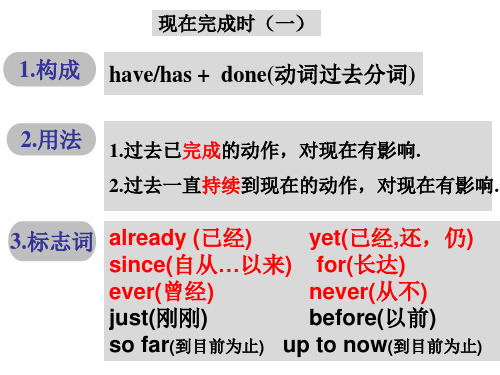
—No, he _h_a_s_g_o_n_e_t_o_ the school library. He left five minutes ago.
Exercise
做过,泛泛而谈,标志词,用现在完成时 做过,有明确的过去时间,用一般过去时
It is + 时间段 since +一般过去时的句子.
1. 他的爷爷已经去世2年了。 It is 2 years since his grandpa died.
2. Nick 参军3年了. It is 3 years since Nick joined the army.
3. 他离开深圳好长时间了。 It is a long time since he left Shenzhen. 4. 这本书我已借了4个月了. It is 4 months since I borrowed the book .
3) I’ve just finished Oliver Twist. 我刚看完《雾都孤儿》这本书。
现在完成时构成 have/ has + done (过去分词)
原形-过去式ed-过去分词ed pick → picked → picked wish → wished → wished
like → liked → liked phone→ phoned → phoned
She hasn’t told us the news yet. 3. The rain has already stopped. (改一般疑问句)
Has the rain stopped yet? 4. I have waited here for two hours. (划线提问)
现在完成时态
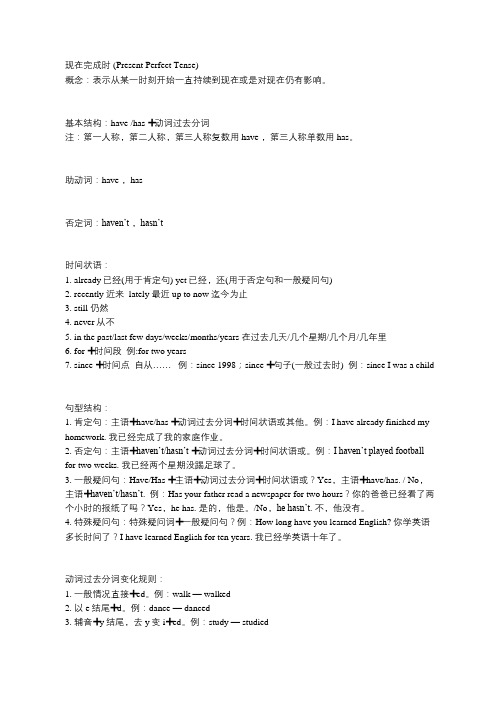
现在完成时 (Present Perfect Tense)概念:表示从某一时刻开始一直持续到现在或是对现在仍有影响。
基本结构:have /has ➕动词过去分词注:第一人称,第二人称,第三人称复数用have ,第三人称单数用has。
助动词:have ,has否定词:haven’t ,hasn’t时间状语:1. already已经(用于肯定句) yet已经,还(用于否定句和一般疑问句)2. recently 近来 lately 最近 up to now 迄今为止3. still 仍然4. never从不5. in the past/last few days/weeks/months/years 在过去几天/几个星期/几个月/几年里6. for ➕时间段例:for two years7. since ➕时间点自从…… 例:since 1998;since ➕句子(一般过去时) 例:since I was a child句型结构:1. 肯定句:主语➕have/has ➕动词过去分词➕时间状语或其他。
例:I have already finished my homework. 我已经完成了我的家庭作业。
2. 否定句:主语➕haven’t/hasn’t ➕动词过去分词➕时间状语或。
例:I haven’t played football for two weeks. 我已经两个星期没踢足球了。
3. 一般疑问句:Have/Has ➕主语➕动词过去分词➕时间状语或?Yes,主语➕have/has. / No,主语➕haven’t/hasn’t. 例:Has your father read a newspaper for two hours?你的爸爸已经看了两个小时的报纸了吗?Yes,he has. 是的,他是。
/No,he hasn’t. 不,他没有。
4. 特殊疑问句:特殊疑问词➕一般疑问句?例:How long have you learned English? 你学英语多长时间了?I have learned English for ten years. 我已经学英语十年了。
现在完成时态
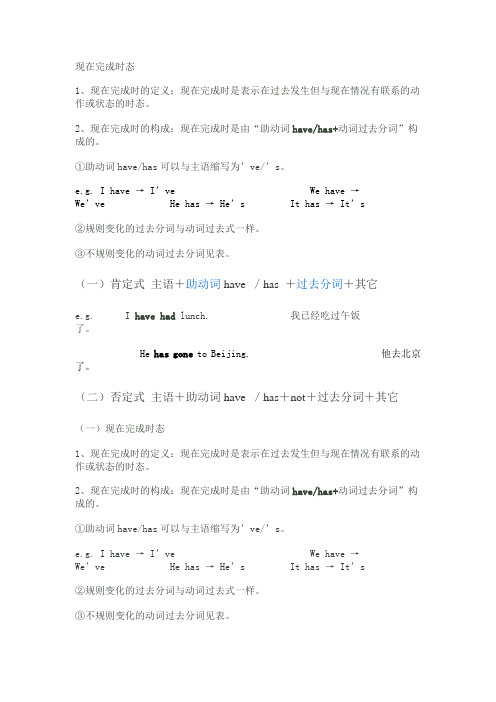
现在完成时态1、现在完成时的定义:现在完成时是表示在过去发生但与现在情况有联系的动作或状态的时态。
2、现在完成时的构成:现在完成时是由“助动词have/has+动词过去分词”构成的。
①助动词have/has可以与主语缩写为’ve/’s。
e.g. I have → I’ve We have → We’ve He has → He’s It has → It’s②规则变化的过去分词与动词过去式一样。
③不规则变化的动词过去分词见表。
(一)肯定式主语+助动词have /has +过去分词+其它e.g. I have had lunch. 我已经吃过午饭了。
He has gone to Beijing. 他去北京了。
(二)否定式主语+助动词have /has+not+过去分词+其它(一)现在完成时态1、现在完成时的定义:现在完成时是表示在过去发生但与现在情况有联系的动作或状态的时态。
2、现在完成时的构成:现在完成时是由“助动词have/has+动词过去分词”构成的。
①助动词have/has可以与主语缩写为’ve/’s。
e.g. I have → I’ve We have → We’ve He has → He’s It has → It’s②规则变化的过去分词与动词过去式一样。
③不规则变化的动词过去分词见表。
3、现在完成时的基本句型。
①陈述句肯定形式。
e.g. I have had lunch. 我已经吃过午饭了。
He has gone to Beijing. 他去北京了。
②陈述句否定形式。
(在助动词have/has后+not,可缩写为haven’t/hasn’t)e.g. I haven’t had lunch. 我还未吃午饭。
He hasn’t gone to Beijing. 他还没有去北京。
(三)一般疑问式助动词Have /Has +主语+过去分词+其它?e.g .1. Have you had lunch? 你吃过午饭了没?--Yes, I have. -- No, I haven’t.2. Has he gone to Beijing? 他去过北京了没有?--Yes, he has. -- No, he hasn’t.否定回答还可以用:No, not yet. / No, never. / No, not even once等。
现在完成时
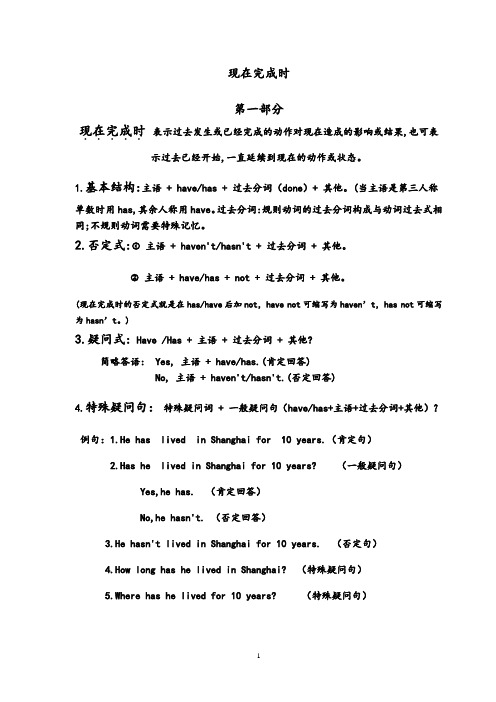
现在完成时第一部分现在完成时.....表示过去发生或已经完成的动作对现在造成的影响或结果,也可表示过去已经开始,一直延续到现在的动作或状态。
1.基本结构:主语+ have/has + 过去分词(done)+ 其他。
(当主语是第三人称单数时用has,其余人称用have。
过去分词:规则动词的过去分词构成与动词过去式相同;不规则动词需要特殊记忆。
2.否定式:①主语+ haven't/hasn't + 过去分词+ 其他。
②主语+ have/has + not + 过去分词+ 其他。
(现在完成时的否定式就是在has/have后加not,have not可缩写为haven’t,has not可缩写为hasn’t。
)3.疑问式: Have /Has + 主语+ 过去分词+ 其他?简略答语: Yes, 主语+ have/has.(肯定回答)No, 主语+ haven't/hasn't.(否定回答)4.特殊疑问句:特殊疑问词+ 一般疑问句(have/has+主语+过去分词+其他)?例句:1.He has lived in Shanghai for 10 years.(肯定句)2.Has he lived in Shanghai for 10 years? (一般疑问句)Yes,he has. (肯定回答)No,he hasn't. (否定回答)3.He hasn't lived in Shanghai for 10 years. (否定句)4.How long has he lived in Shanghai? (特殊疑问句)5.Where has he lived for 10 years? (特殊疑问句)①当have/has被用在现在完成时态中时,它可以和前面的代名词一起组成缩写形式。
have可缩写为’ve,has可缩写为’s。
如:I've ,He's②现在完成时用not来表达否定形式。
现在完成时态的概念及用法大全

现在完成时态的概念,基本用法以及过去分词的变法一.基本结构:助动词have/has+过去分词二.句型:否定句:主语+have/has+not+过去分词+其他.一般疑问句:Have/Has+主语+过去分词+其他.简略答语: Yes, 主语+ have/has.(肯定)No, 主语+ haven't/hasn't.(否定)三.用法(1)现在完成时表示过去发生或已经完成的动作对现在造成的影响或结果I have spent all of my money.(含义是:现在我没有钱花了.)Guo zijun has (just/already) come. (含义:郭子君现在在这儿)My father has gone to work. 我爸爸已经去上班了(含义是:我爸爸现在不在这儿)(2)过去已经开始的动作一直持续到现在, 甚至有可能继续持续下去,可以和表示延续的时间状语连用。
表示持续动作或状态的动词多是延续性动词。
①for + 时段②since+过去一个时间点(译为:自从……以来)③since+时段+ago④since+从句(过去时)●⑤It is+时段+since+从句(过去时)Mary has been ill for three days.玛丽已经病了三天了。
It is two years since he became a student.四.has gone (to),has been (to), has been (in) 的区别Have/Has gone(to) :去了(现在不在说话现场)Where is your father?He has gone to Shanghai.他已经去上海了。
Have/Has been (to) :去过(已不在去过的地方)My father has been to Shanghai. 我爸爸曾经去过上海Have/has been in:呆了一段时间,现在还在所呆的地方(表示一个延续的状态)My father has been in Shanghai for two months. /since two months ago.五.现在完成时的标志1.现在完成时的含义之一是过去完成的动作对现在仍有影响,用以下四大标志词可以表达这种含义:* 以already, just和yet为标志He has already got her help.他已得到她的帮助。
现在完成时的概念、构成及用法
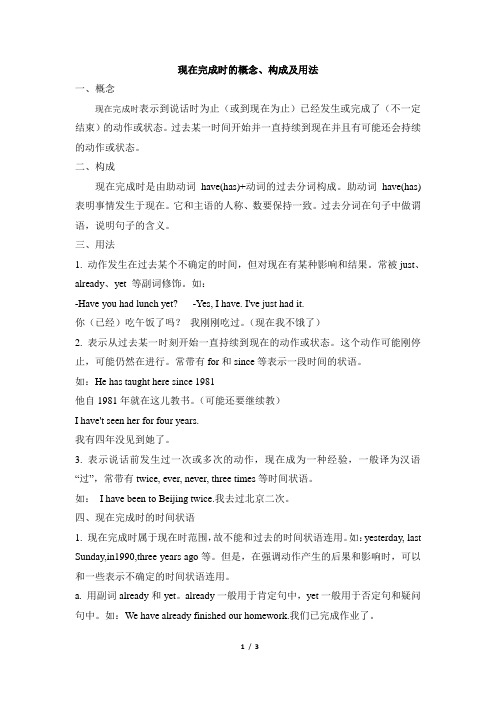
现在完成时的概念、构成及用法一、概念现在完成时表示到说话时为止(或到现在为止)已经发生或完成了(不一定结束)的动作或状态。
过去某一时间开始并一直持续到现在并且有可能还会持续的动作或状态。
二、构成现在完成时是由助动词have(has)+动词的过去分词构成。
助动词have(has)表明事情发生于现在。
它和主语的人称、数要保持一致。
过去分词在句子中做谓语,说明句子的含义。
三、用法1. 动作发生在过去某个不确定的时间,但对现在有某种影响和结果。
常被just、already、yet 等副词修饰。
如:-Have you had lunch yet? -Yes, I have. I've just had it.你(已经)吃午饭了吗?我刚刚吃过。
(现在我不饿了)2. 表示从过去某一时刻开始一直持续到现在的动作或状态。
这个动作可能刚停止,可能仍然在进行。
常带有for和since等表示一段时间的状语。
如:He has taught here since 1981他自1981年就在这儿教书。
(可能还要继续教)I have't seen her for four years.我有四年没见到她了。
3. 表示说话前发生过一次或多次的动作,现在成为一种经验,一般译为汉语“过”,常带有twice, ever, never, three times等时间状语。
如:I have been to Beijing twice.我去过北京二次。
四、现在完成时的时间状语1. 现在完成时属于现在时范围,故不能和过去的时间状语连用。
如:yesterday, last Sunday,in1990,three years ago等。
但是,在强调动作产生的后果和影响时,可以和一些表示不确定的时间状语连用。
a. 用副词already和yet。
already一般用于肯定句中,yet一般用于否定句和疑问句中。
如:We have already finished our homework.我们已完成作业了。
现在完成时用法大全
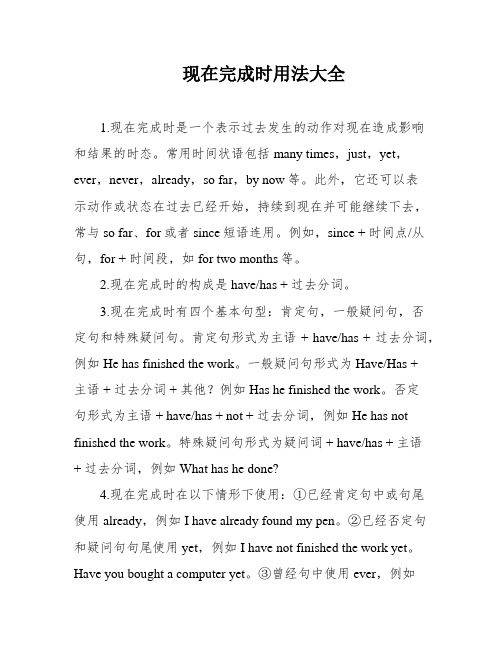
现在完成时用法大全1.现在完成时是一个表示过去发生的动作对现在造成影响和结果的时态。
常用时间状语包括many times,just,yet,ever,never,already,so far,by now等。
此外,它还可以表示动作或状态在过去已经开始,持续到现在并可能继续下去,常与so far、for或者since短语连用。
例如,since + 时间点/从句,for + 时间段,如for two months等。
2.现在完成时的构成是have/has + 过去分词。
3.现在完成时有四个基本句型:肯定句,一般疑问句,否定句和特殊疑问句。
肯定句形式为主语 + have/has + 过去分词,例如He has finished the work。
一般疑问句形式为Have/Has +主语 + 过去分词 + 其他?例如Has he finished the work。
否定句形式为主语 + have/has + not + 过去分词,例如He has not finished the work。
特殊疑问句形式为疑问词 + have/has + 主语+ 过去分词,例如What has he done?4.现在完成时在以下情形下使用:①已经肯定句中或句尾使用already,例如I have already found my pen。
②已经否定句和疑问句句尾使用yet,例如I have not finished the work yet。
Have you bought a computer yet。
③曾经句中使用ever,例如Have you ever seen pandas。
④从不句中使用never,例如I have never been to Beijing。
⑤刚刚句中使用just,例如I have just done my work。
⑥以前句尾使用before,例如I have never been there before。
现在完成时态表示
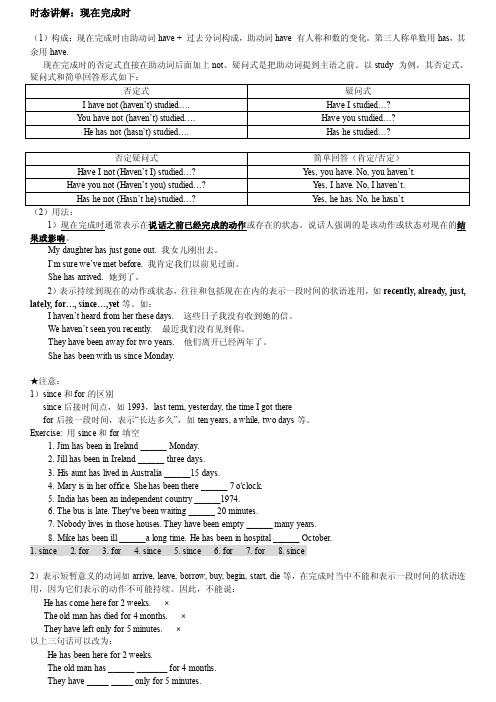
时态讲解:现在完成时(1)构成:现在完成时由助动词have + 过去分词构成,助动词have 有人称和数的变化。
第三人称单数用has,其余用have.现在完成时的否定式直接在助动词后面加上not、疑问式是把助动词提到主语之前。
以study 为例,其否定式、疑问式和简单回答形式如下:1)现在完成时通常表示在说话之前已经完成的动作或存在的状态。
说话人强调的是该动作或状态对现在的结果或影响。
My daughter has just gone out. 我女儿刚出去。
I’m sure we’ve met before. 我肯定我们以前见过面。
She has arrived. 她到了。
2)表示持续到现在的动作或状态,往往和包括现在在内的表示一段时间的状语连用,如recently, already, just, lately, for…, since…,yet等。
如:I haven’t heard from her these days. 这些日子我没有收到她的信。
We haven’t seen you recently. 最近我们没有见到你。
They have been away for two years. 他们离开已经两年了。
She has been with us since Monday.★注意:1)since和for的区别since后接时间点,如1993,last term, yesterday, the time I got therefor后接一段时间,表示“长达多久”,如ten years, a while, two days等。
Exercise: 用since和for填空1. Jim has been in Ireland ______ Monday.2. Jill has been in Ireland ______ three days.3. His aunt has lived in Australia ______15 days.4. Mary is in her office. She has been there ______ 7 o'clock.5. India has been an independent country ______1974.6. The bus is late. They've been waiting ______ 20 minutes.7. Nobody lives in those houses. They have been empty ______ many years.8. Mike has been ill ______a long time. He has been in hospital ______ October.1. since2. for3. for4. since5. since6. for7. for8. since2)表示短暂意义的动词如arrive, leave, borrow, buy, begin, start, die等,在完成时当中不能和表示一段时间的状语连用,因为它们表示的动作不可能持续。
英语时态:现在完成时
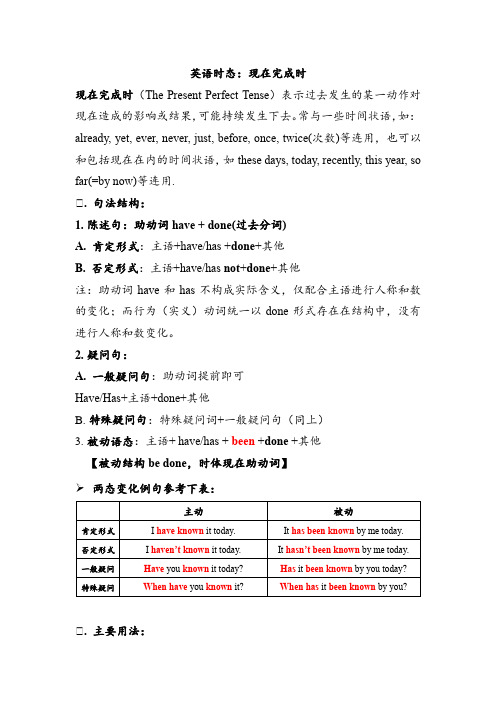
英语时态:现在完成时现在完成时(The Present Perfect Tense)表示过去发生的某一动作对现在造成的影响或结果,可能持续发生下去。
常与一些时间状语,如:already, yet, ever, never, just, before, once, twice(次数)等连用,也可以和包括现在在内的时间状语,如these days, today, recently, this year, so far(=by now)等连用.Ⅰ. 句法结构:1.陈述句:助动词have + done(过去分词)A. 肯定形式:主语+have/has +done+其他B. 否定形式:主语+have/has not+done+其他注:助动词have和has不构成实际含义,仅配合主语进行人称和数的变化;而行为(实义)动词统一以done形式存在在结构中,没有进行人称和数变化。
2.疑问句:A. 一般疑问句:助动词提前即可Have/Has+主语+done+其他B.特殊疑问句:特殊疑问词+一般疑问句(同上)3.被动语态:主语+ have/has + been +done +其他【被动结构be done,时体现在助动词】➢两态变化例句参考下表:Ⅰ. 主要用法:1.表示到说话人说话时已经完成的动作,却对现在仍有影响或结果。
He has lost his book.2.表示事情开始与过去,却一直持续到现在还在进行的事情。
He has taught in our school for 30 years.3.表示从过去某个时间直到现在的这个时间范围内不断重复发生的动作或情况,并且这个不断重复的动作有可能继续下去,也有可能到现在就结束。
My father has always gone to work by bike.4.同一般现在时可以表示将来一样,现在完成时也可以在时间状语从句里表示将来。
I’ll wait until he has written his letter.Ⅰ. 常用于现在完成时的时间状语:for, since, already, yet, ever, never, recently, just, before, so far, by now等1.for+段时间;since+(过去的某一个)点时间I have lived in Nanning for ten years.I have lived in Nanning since ten years ago.2.already用于肯定句, 可放在助动词之后、过去分词之前,也可放在句末。
现在完成时
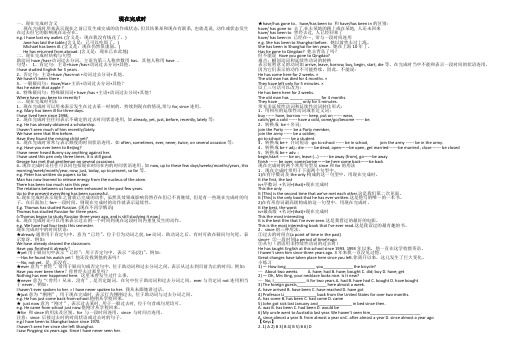
现在完成时一、现在完成时含义现在完成时用来表示现在之前已发生或完成的动作或状态,但其结果却和现在有联系, 也就是说, 动作或状态发生在过去但它的影响现在还存在。
e.g. I have lost my wallet. (含义是:现在我没有钱花了。
)Jane has laid the table.(含义是:已可以吃饭了。
)Michael has been ill. (含义是:现在仍然很虚弱。
)He has returned from abroad. (含义是:现在已在此地)二、现在完成时结构与句型助动词have /has+动词过去分词,主语为第三人称单数用has,其他人称用have 。
句型:1、肯定句:主语+have /has+动词过去分词+其他。
I have studied English for 5 years .2、否定句:主语+have /has+not +动词过去分词+其他。
We haven’t been there .3、一般疑问句:Have/Has+主语+动词过去分词+其他?Has he eaten that apple ?4、特殊疑问句:特殊疑问词+ have /has +主语+动词过去分词+其他?Where have you been to recently?三、现在完成时用法1、现在完成时可以用来表示发生在过去某一时刻的、持续到现在的情况,常与for, since连用。
e.g. Mary has been ill for three days.I have lived here since 1998.2、现在完成时往往同表示不确定的过去时间状语连用, 如already, yet, just, before, recently, lately等:e.g. He has already obtained a scholarship.I haven’t seen much of him recently/lately.We have seen that film before.Have they found the missing child yet?3、现在完成时常常与表示频度的时间状语连用,如often, sometimes, ever, never, twice, on several occasion等:e.g. Have you ever been to Beijing?I have never heard Bunny say anything against her.I have used this pen only three times. It is still good.George has met that gentleman on several occasions.4、现在完成时还往往可以同包括现在时间在内的时间状语连用,如now, up to these few days/weeks/months/years, this morning/week/month/year, now, just, today, up to present, so far等。
现在完成时态

现在完成时态(一)定义:现在完成时(Present perfect)过去发生并且已经完成的动作对现在造成影响或后果,过去某一时间开始并一直持续到现在并且有可能还会持续的动作或状态。
(二)基本结构:主语+have/has+动词的过去分词(p.p)(V-ed)或done①肯定句:主语+have/has+动词的过去分词(p.p)(V-ed)+宾语.②否定句:主语+have/has+not+动词的过去分词(p.p)(V-ed)+宾语.③一般疑问句:Have/Has+主语+动词的过去分词(p.p)(V-ed)+宾语.④特殊疑问句:特殊疑问词或词组+一般疑问句(have/has+主语+过去分词(V-ed)+其他)(三)用法:(1)现在完成时用来表示现在之前已发生过或完成的动作或状态,但其结果却和现在有联系,也就是说,动作或状态发生在过去但它的影响现在还存在,也就是说,动作发生在过去,而对现在造成的影响和结果.I have spent all of my money.(现在我没有钱花了.)Jane has laid the table.(简已经摆好了桌子)Michael has been ill.(现在仍然很虚弱)He has returned from abroad. (现在已在此地)(2)现在完成时可以用来表示发生在过去某一时刻的,持续到现在的动作(用行为动词表示)或状态(be动词表示)常与for(+时间段),since(+时间点或过去时的句子)连用.①for+时段为…时间②since+过去一个时间点(译为:自从……以来)③since+时段+ago④since+从句(过去时)⑤It is+时段+since+从句(过去时)Mary has been ill for three days.I have lived here since 1998.●注:瞬间动词(buy,die,join,lose……)不能直接与for since 连用。
高中英语语法之现在完成时

现在完成时讲解一、基本结构:主语+have/has+过去分词(done)①肯定句:主语+have/has+过去分词+其他②否定句:主语+have/has+not+过去分词+其他③一般疑问句:Have/Has+主语+过去分词+其他④特殊疑问句:特殊疑问词+一般疑问句(have/has+主语+过去分词+其他)二、用法1)现在完成时的"完成用法"现在完成时用来表示现在之前已发生过或完成的动作或状态,但其结果却和现在有联系,也就是说,动作或状态发生在过去但它的影响现在还存在.He has turned off the light.他已把灯关了。
(动作结束于过去,但说明的是现在的情况--灯现在不亮了。
)I have spent all of my money.(含义是:现在我没有钱花了.)Jane has laid the table.(含义是:现在桌子已经摆好了.)2)现在完成时的"未完成用法"指的是动作开始于过去某一时刻,一直延续到现在,或可能还要继续下去。
这里的动词要用持续性动词。
常与for (+时间段),since(+时间点)连用.Mary has been ill for three days.Mary has been ill since three days ago.注意:1.现在完成时不能单独与准确时间连用,(如表示过去的时间状语)如yesterday(morning、afternoon),last(morning、afternoon)等,除非与for, since连用.2.现在完成时往往同表示不确定的过去时间状语连用,如already(肯定), yet(否定,疑问), just, before, recently, still, latel y等:He has already obtained a scholarship.I haven't seen much of him recently (lately).We have seen that film before.Have they found the missing child yet ?3. 现在完成时常常与表示频度的时间状语连用,如ever, never, twice, several times等:Have you ever been to BeijingI have never heard Bunny say anything against her.I have used this pen only three times. It is still good.George has met that gentleman several times.4. 现在完成时还往往可以同包括现在时间在内的时间状语连用,如up to these few days/weeks/months/years, just, up to present(now), so far等:Peter has written six papers so far.Up to the present everything has been successful.5. 现在完成时还可以用来表示过去的一个时间到现在这段时间内重复发生的动作.We have had four texts this semester.6. have been to 和have gone to的区别have been to 强调“去过”,现已不在那里,如:He has been to the USA three times.他到美国去过三次。
现在完成时态讲解

He has been a teacher since 2000. 他从2000年就开始当老师了。
lie-lay (lied)-lain (lied)
• 特殊: • am/is-was-been are-were-been, • do (does)-did-done go-went-gone • see-saw-seen • show-showed-shown (showed)
现在完成时的用法
常与现在完成时连用的副词:already,just,yet,ever,never等。 already,just多用于肯定句中,yet,ever,never多用于疑问句和 否定句中。 如: ① I have already finished my homework.
我已经做完家庭作业了。 ② He has just had his meal.
1.表示过去发生或完成的某一动作对现在造成的影响或结果。 如: ① -- It’s so dark.
--Someone has turned off the light. (有人刚把灯关了,对现在造成的结果是:现在很黑) ② -- Are you free? --I have finished my homework. I am free (我已经完成了家庭作业,对现在造成的结果是很有空) Practice: 1. My father bought many books for me yesterday . Now , I have a lot to read because _m_y__fa_t_h_e_r__h_a_s_b_o_u_g_h_t_m__a_n_y_b_o_o_k_s_f_o_r__m_e_. 2. I saw this film last week. Now, I know this film because I__h_a_v_e_s_e_e_n__it__b_e_f_o_re____.
现在完成时的概念

现在完成时(Present Perfect Tense)概述现在完成时是英语中的一种时态,用来表示过去发生的动作或事件与现在的关系。
它使用助动词“have” 或“has” 和动词的过去分词形式构成,具体形式为“have/has + 过去分词”。
1. 定义现在完成时用于描述过去发生的动作或事件与现在存在的关系。
它可以表示以下几个不同的情况:•表示过去发生的动作或事件对现在造成的影响或结果。
•表示从过去某个时间点开始一直延续到现在的动作或事件。
•表示过去某个时间点前发生的动作或事件对现在造成的影响或结果。
现在完成时可以与一些时间状语连用,如:“already”(已经)、“yet”(还)、“just”(刚刚)、“ever”(曾经)、“never”(从未)、“so far”(到目前为止)等,以强调动作或事件在过去发生的时间点或范围。
2. 重要性现在完成时在英语语法中具有重要的作用,它能够准确表达过去与现在之间的关系。
通过使用现在完成时,我们可以清楚地表示一个动作或事件发生在过去,且对现在产生了某种影响、结果或延续。
除了用于描述个人经历、经验和成就,现在完成时还有其他一些重要的用途:2.1 表示已完成的动作或事件现在完成时可以用来表示之前已经完成的动作或事件。
例如:•I have finished my homework.(我已经完成了我的作业。
)•They have gone to the cinema.(他们已经去电影院了。
)这里的动作或事件在过去的某个时间点已经发生并完成。
2.2 表示从过去持续到现在的动作或事件现在完成时也可以用来表示一个动作或事件从过去某个时间点开始一直延续到现在。
例如:•I have lived in this city for five years.(我在这个城市已经住了五年。
)•She has worked at this company since 2010.(她从2010年开始在这家公司工作。
新概念一现在完成时
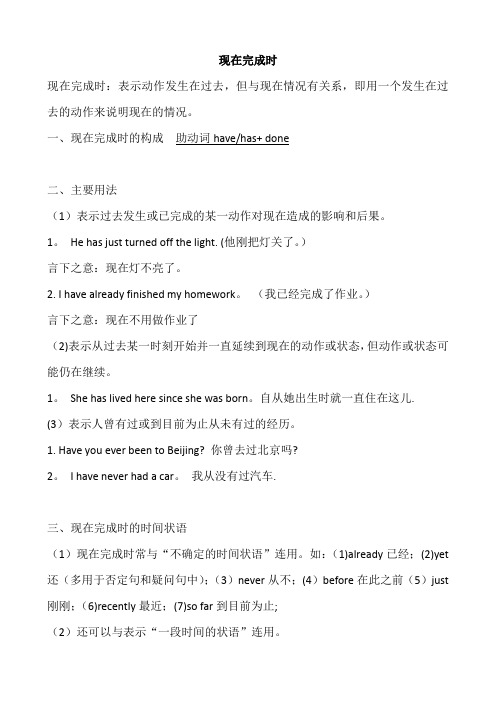
现在完成时现在完成时:表示动作发生在过去,但与现在情况有关系,即用一个发生在过去的动作来说明现在的情况。
一、现在完成时的构成助动词have/has+ done二、主要用法(1)表示过去发生或已完成的某一动作对现在造成的影响和后果。
1。
He has just turned off the light. (他刚把灯关了。
)言下之意:现在灯不亮了。
2. I have already finished my homework。
(我已经完成了作业。
)言下之意:现在不用做作业了(2)表示从过去某一时刻开始并一直延续到现在的动作或状态,但动作或状态可能仍在继续。
1。
She has lived here since she was born。
自从她出生时就一直住在这儿. (3)表示人曾有过或到目前为止从未有过的经历。
1. Have you ever been to Beijing? 你曾去过北京吗?2。
I have never had a car。
我从没有过汽车.三、现在完成时的时间状语(1)现在完成时常与“不确定的时间状语”连用。
如:(1)already已经;(2)yet 还(多用于否定句和疑问句中);(3)never从不;(4)before在此之前(5)just 刚刚;(6)recently最近;(7)so far到目前为止;(2)还可以与表示“一段时间的状语”连用。
Ⅰsince1。
since+时间点I have worked here since 2006。
2006年以来,我一直在这里工作。
2。
since+一段时间+agoI have known Lily since 2 years ago.自从两年前,我就认识了lily.Ⅱ for+一段时间(two days\two weeks\three years)表示持续……时间She has worked here for 3 years。
她在这里工作3年了.四、现在完成时与一般过去时的用法比较(1)一般过去时表示过去发生的动作或单纯叙述过去的事情,强调动作发生在过去,和现在没有关系。
现在完成时(超全)

现在完成时精讲精练现在完成时的结构:肯定形式:have/has + done 否定形式:have/has + not +done一般疑问句形式:have或has放于句首。
现在完成时表达的意义:一. 表示过去发生或已经完成的动作对现在造成的影响或结果。
eg. (1). The car has arrived. 车子来了。
(结果:车子已在门口)(2). Someone has broken the window. 有人把窗户打破了。
(结果:窗户仍破着)现在完成时通常和recently(近来), ever, never, twice, so far(到目前为止), since,for,in the past/last few years(在过去几年里), already(已经), yet(仍然), just (刚刚), before等词连用。
说明:already与yet都有“已经”的意思,但already常用于肯定句,并用于句中。
yet常用于否定句和疑问句,并用于句末。
例如:I have already finished my homework.I haven’t finished my homework yet.Have you finished your homework yet?注意:表示短暂时间动作的词,如:come,go,die,marry,buy等,它们的完成时不能与for,since 等表示一段时间的词连用。
二、表示过去已经开始,持续到现在的动作或状态,可以和表示从过去某一时刻延续到现在的一段时间的状语连用, 如for+时间段、since+过去的时间点、疑问词how long等。
e.g. (1). My uncle has worked at this factory for five years.(2). Mr. Black has lived in China since 2002.(3). How long have you been here?注意:此种用法中表示持续动作或状态的动词必须是延续性动词(否定句除外)。
- 1、下载文档前请自行甄别文档内容的完整性,平台不提供额外的编辑、内容补充、找答案等附加服务。
- 2、"仅部分预览"的文档,不可在线预览部分如存在完整性等问题,可反馈申请退款(可完整预览的文档不适用该条件!)。
- 3、如文档侵犯您的权益,请联系客服反馈,我们会尽快为您处理(人工客服工作时间:9:00-18:30)。
现在完成时练习0011. The children ________________(watch) TV since noon. Will you stop them?2. They _________________(build) the road since 1978 and still __________________(not complete) it yet.3. Joe __________________(read) the book for only an hour, but ________________(cover) over thirty pages.4. We _________________(hope) to visit this place for many years, but still ___________________(not get) a chance to.5. We __________________(look) for it for a whole day and still ________________(not find) it.用动词的现在完成时或一般过去时填空1.--- __________you _________(book) your hotel room yet?---Well, I ___________(write) to the hotel last week but they _______________(not answer) yet.2.---You _________just _________(agree) to go, so why aren't you getting ready?---But I _________(not realize) that you ________(want) me to start at once.4. ---I can't find my gloves. ________you ________(see) them?---Yes, you _________(leave) them in the car yesterday. I ____________(put) them back in your drawer.5. ---I hear that Mr Jones _____________(leave).1.-Dad, I ________ the station for minutes, but nobody came to meet me.-Don't worry. I'll go to meet you soon.A. arrived atB. have been atC. will reach2. -________ you ever _________ Dali?-Never. But I am going there this vacation.A. Do…go toB. Have…been toC. Have…gone toD. Will…go to3. My aunt is a writer. She ____ more than ten books since 1980.A. writesB. wroteC. has writtenD. will write4. Echo _____ for half a month. She'll come hack in two months.A. left B leave C. has left D. has been away5.The Smiths came to Shanghai in 2008,they__ there for three years since then.A. liveB. livedC. have livedD. will live6. - Have you ever been to Nanning? - Yes, _______ .A. I wasB. I doC. I amD. I have7. I my homework, I guess I can't join you.A. don't finishB. didn't finishC. haven't finishedD. won't finish8. -Excuse me, where is Mr. Brown's office? Sorry, I don't know. I _____ here for only a few days.A. workB. workedC. have workedD. will work9.-Where is Bob? -He ______to Harbin for a meeting.A. wentB. has beenC. has gone10. - Are you going to the bank, Laura? -No, I ______ to the bank already.A. have beenB. have goneC. am goingD. had been11. ----Oh, you are here. I'm looking for you all the morning. ?--To the library.A. Where have you goneB. Where will you goC. Where are you goingD. Where have you been?12. So far this year, many new houses ________ in Wenchuan with the help of the government.A. buildB. are builtC. will buildD. have been built13. My grandmother ______ a lot of changes in Tianjin since she came here.A.sees B. can see C. will see D. has seen14.I many new friends since I came here.A.make B.made C.will make D.have made15. Mrs. Weng came back from France in 2010. She _____ there for four years.A. worksB. workedC. has worked16. "Where's your brother, Jane?""He's not in Guiyang these days. He________ Beijing.'A. has gone toB. has been toC. had been to17. She _______ this book for nearly three weeks.A. has borrowedB. has lentC. has boughtD. has kept18. They _____ England and they will be back next week.A. have gone toB. have been toC. have gone inD. has been on19. He_______ in this city since his family moved to Nanchong.A. liveB. livedC. has lived20. Some students in Shanghai e-bags for several months.A. haveB. have hadC. hadD. will have21.-Is Mr. Smith still in Shanghai?-Yes, he ______ there for two months.A. has beenB. has goneC. has been toD. has gone to22. My brother and I _____ in Yinchuan since 1997.A. had livedB. have livedC. liveD. will live23. My pen pal said he would write to me, but I ___ any letters from him so far.A. won't receiveB. haven't receivedC. hadn't receivedD. didn't receive24.Our country ______the sixth population census(人口普查) already.A. finishedB. has finishedC. will finishD. finishes25.Thomas ______ the army for two years, so he misses his mother very much.A. has joinedB. has taken part inC. has been in26.-How well do you know the Opera House?-I know the place very well. I ____ Sydney many times.A. have been inB. have been toC. have gone toD. have arrived in27.A:How clean the bedroom is!B: Yes, I am sure that someone it.A. cleansB. cleanedC. has cleanedD. had cleaned28.- Where is Ben? - He ____ to the teachers' office. He will be back soon.A. goB. has goneC. has been29. I ______my hometown for a long time, I really miss it!A. leftB. went away fromC. have leftD. have been away from30. -Will you please go to see the movie Guanyinshan with me?-No, I won't. I ______ already.A. sawB. have seenC. seeD. will see31. -Where is John? -He ______ the science lab.A. has gone toB. has been toC. went to32. - How do you like your English teacher?- He is great. We friends since three years ago.A. wereB. have madeC. have beenD. have become33.-Hi, guys. Where are you heading now?-Home. We _________all our money, so we have to walk home now.A. spendB. spentC. have spentD. are spending34. - _____ you _____ the movie Gongfu Panda II ?- Not yet. I'll see it this Sunday.A. Did, seeB. Do, seeC. Have, seen35.British Prince William(威廉王子) and Kate _____ for nearly two months.A. marriedB. have marriedC. have been marriedD. have got married36. Jim _________ in Zhuzhou since he finished his college.A. worksB. is workingC. has worked38. -May I speak to Lin T ao?-Sorry, he is not in. He ______ to Changsha.A. has beenB. has goneC. went39. He promised to pick me up at the school gate. However. he __ yet.A. didn't arriveB. doesn't arriveC. isn't arrivingD. hasn't arrived40. Great changes _________ in T ongren in the past five years.A. have happenedB. have taken placeC. have been happenedD. have been taken place41. You are too late. The film ______ since half an hour ago.A. has begunB. has been onC. began42. ---- Why won't you go to the movie with me, Gina?-- Because I it twice.A. seeB. have seenC. sawD. will see43. -Where's your father, Tom? -He__ to Changsha.A.goesB. wentC. has gone44. - Where is my sister, mum? - She ______ to the library. She will be back soon.A. has beenB. is goingC. has goneD. will go45.-May I speak to Mary?-Sorry, she isn't in. She to Japan and will come back in two weeks.A. has beenB. has goneC. is going46. -Are Li Yan and Wang Mei still living in Pingba?-No, they ____ to Shanghai.A. had movedB. movedC. will moveD. have moved47. Mr. Fan ___ this watch in 2005. he ____ it for 6 years.A .bought, has had B. bought, has C. has bought, has had D. has bought, had48. Mr. White came to our school in 2008, and since then he us English.A. teachesB. taughtC. has taughtD. will teach49. -China develops so fast. -That's true. It ______ a lot already.A. changesB. changedC. will changeD. has changed50. - Jim isn't in the classroom. Where is he?- He _____ to the teacher's office.A. will goB. has goneC. had goneD. is going51. Lanmon ______ here for almost ten years and he has many Chinese friends.A. has beenB. leftC. has comeD. came52. -Have you ever visited Germany?-____________. But I expect to go there again.A. PerhapsB. No, I haven'tC. I don't knowD. Yes, I have53. -May I speak to Miss Wang?-Sorry. She isn't in. She __________ to Hong Kong.A. has beenB. has goneC. goesD.went54. Sam came to Baihai in 2002. He __________ here for nine years.A. livesB. was livingC. has livedD. will live55. He _____in Xinxiang for five years when I heard his news.A. has livedB. had livedC. is livingD. has been lived56.Our school is having a sports meeting. Someone _____ here already.A. arrivedB. have arrivedC. has arrived现在完成时是一个与过去和现在都有关系的时态,因此,具有这样时间特点的状语都可以与现在完成时连用。
